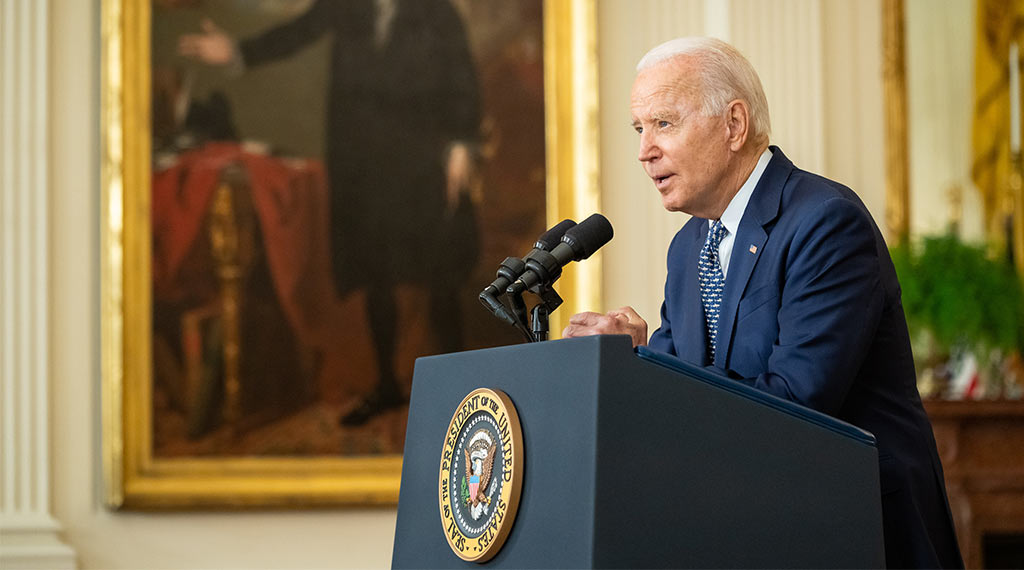Biden’s China diplomacy blunder

President Joe Biden, on Tuesday, October 5th, said that he had spoken to Chinese President Xi Jinping and both of them had agreed to “stick to” the “Taiwan agreement.”
The only known recent conversation between Biden and Xi took place on September 9th. The “read out” provided by the White House says nothing either about Taiwan or the Taiwan agreement. So we are left rather in the dark about what transpired. Even so, given Mr. Biden’s statement about the “Taiwan agreement,” his statement is extremely worrisome.
The nature of that conversation and Mr. Biden’s description was not lost on the Taiwanese or the Japanese, so much so that the State Department moved immediately to clarify its meaning to Taiwan’s President. That would not have been necessary if the State Department was not alarmed by what President Biden said.
Japan also announced that it would come to Taiwan’s aid if Taiwan was attacked.
What took place between Biden and Xi requires some explanation.
To begin with, there is no “Taiwan agreement” per se. What is in place are three US-China communiques issued on different dates (February 28, 1972, January 1, 1979 and August 17, 1982).
The first of these is known as the Shanghai communique and it summarizes a dialog that took place between then-President Richard Nixon and Chinese premier Zhou Enlai. In that communique the U.S. formally “acknowledged” that “all Chinese on either side of the Taiwan Strait maintain there is but one China.” The statement is ambiguous and poorly describes the people of Taiwan.
The second communique was on the establishment of U.S.-China diplomatic relations and included the U.S. declaration that it would end formal diplomatic relations with the Republic of China (aka Taiwan).
The third communique reiterated the previous two and included a declaration that the U.S. intended “to gradually decrease arms sales to Taiwan.”
All of these communiques caused a firestorm in the Congress. The first led to Congress adopting the Taiwan Relations Act (TRA) and the third violated the terms of the TRA which declares that the U.S. will provide arms to Taiwan “of a defensive character.”
The administration backed off in two ways. First, cables were sent from the U.S. to the U.S. “embassy” in Taiwan, which is known as the “American Institute in Taiwan” or AIT. Under Secretary of State Larry Eagleburger told the AIT Director, Jim Lilley, that any reduction in arms sales would be contingent on a Chinese commitment to peace across the Taiwan Strait. But this declaration was not adequate to the problem of the Third communique.
Secretary of State George Schultz, seeing the furor over the Third communique and that the Eagleburger message to Lilley failed to convey real or workable assurances to Taiwan, took matters in his own hands and, again through AIT Director Lilley, offered Taiwan “Six Assurances.”
The Six Assurances said (1) that the U.S. had not agreed to set a date for ending arms sales to Taiwan (because the Taiwanese apparently learned this was the intent of the Third communique); (2) that the U.S. had not agreed to consult with China on arms sales to Taiwan (something else that the Taiwanese had discerned through their intelligence channels); (3) that the U.S. would not play a mediating role between Taipei and Beijing (something that Biden appears to have violated in his talk with Xi); (4) that the U.S. had not agreed to revise the Taiwan Relations Act (apparently in the discussions that then took place between China and the U.S. where changing the TRA was on the table); (5) had not altered its position regarding sovereignty over Taiwan; (6) and the U.S. would not pressure Taiwan to negotiate with China.
Not all of the Six Assurances were strong enough or clear enough over time. In the intervening years the U.S. held back on arms sales to Taiwan, put limitations on equipment that was sold (reducing the range of fighter aircraft, denying long range missiles, or simply not selling requested equipment), or delaying sales for long periods of time. In short, the U.S. government helped to weaken Taiwan rather than strengthen the island. There was strong reason to believe that secret negotiations with China on arms sales to Taiwan have taken place since the Six Assurances of 1982.
After Biden’s statement on the “Taiwan agreement” the State Department told Taiwan in a forceful way that the Six Assurances remained in place although State conveniently forgot about the various ways it has limited or blocked arms sales in the past to Taiwan.
The White House has announced that Mr. Biden and Mr. Xi will hold a “virtual” conference later in October. Whether the conference actually takes place is open to doubt, since Xi certainly understands that what Biden told him about both China and the U.S. adhering to the “Taiwan agreement” was directly undermined by the State Department, meaning that what Biden may, or may not say, is not regarded as definitive in Beijing.
But if a conference still goes ahead, Mr. Biden has to be put straight on U.S. policy. He should also be clear in speaking to the Chinese that their incursions by air and sea around Taiwan are unacceptable and will be met firmly by counter action by the United States. If Mr. Biden fails to do that, it will cause major problems for America’s posture in east Asia and will be damaging not only to Taiwan, but also to Japan and other U.S. friends in the region. In fact, if we do not deter China, the risk of war escalates.
- Trump and Ukraine: what Russia wants, what Trump could do - November 8, 2024
- North Korean troops in Kursk could backfire on Moscow, Pyongyang - November 1, 2024
- Secure enclaves: bad CHIPS Act idea wasting billions - August 12, 2024
